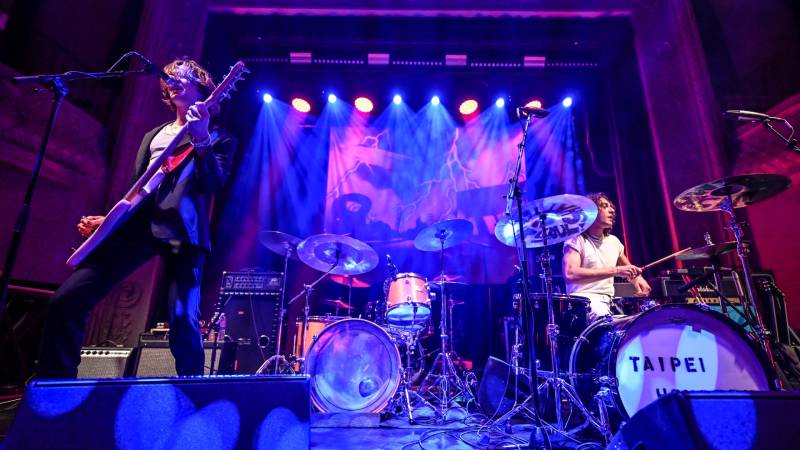At the moment New York, Nashville, and Los Angeles are the cities where music making happens. But San Francisco hopes to add itself to that list. To that end, last month, Mayor Daniel Lurie announced San Francisco Music Week — which coincides with the Noise Pop Festival and includes live performances, workshops, and talks from industry insiders about how to reinvigorate the local music scene. We’ll talk to music makers and shakers about how the city can support live music and how the music scene could help revive the city’s economy.
SF Music Week Promotes Local Industry as Economic Engine

Guests:
Nastia Voynovskaya, editor and reporter, KQED Arts
Jordan Kurland, co-owner and producer, Noise Pop Industries, which organizes the Noise Pop Festival; co-founder and partner, Brilliant Corner Artists Management
Laline St. Juste, musician, producer and solo artist, sings with the band The Seshen; founder, 7000 Coils, the independent record label
P-Lo Paolo Rodriguez, musician and producer, His latest album is "For the Soil"
Tina Davis, president, Empire, an independent record label based in San Francisco
Show Highlights
Challenges for Local Musicians and Venues
Despite San Francisco’s rich musical heritage, local musicians and venues struggle to survive. Laline St. Juste, musician, producer, and founder of the independent label 7000 Coils, says that rising living costs and the tech industry’s influence have changed the landscape. She has seen many artists forced to leave the city.
Venues have also faced challenges, especially after the pandemic. According to Kurland, ticket sales remain inconsistent, with some events doing well and others struggling.
“I interview a lot of venue owners and operators. What I hear is that people today might be more likely to spend hundreds of dollars to see a top forty artist than to come out to a fifteen dollar show to support a local artist,” Nastia says.
Efforts to Revitalize the Music Scene
The city is taking steps to support the local music industry. Kurland is optimistic about Mayor Lurie’s focus on arts and culture but emphasizes the need for better representation and support from the city.
“We have the arts commission, which does not represent live music or musicians. We have the entertainment commission, which is focused more on permitting than anything else. And we have the nightlife commission, which certainly touches on clubs and bars, but it still does not really touch on the grassroots music industry,” he says.
The Role of Technology and Record Labels
San Francisco’s tech boom has driven up living costs, but some see potential for synergy between technology and the music industry. P-Lo, a local rapper and producer, says, “That bridge hasn’t been built yet, but I think it will happen in San Francisco or the Bay because of its proximity.”
Tina Davis, president of the independent record label EMPIRE, highlights the disruptive role her company plays in the industry. “We are in San Francisco, and we are true to culture, the authentic artist, and their sound,” she says.
The Bottom Line
“I have been able to connect with such creative minds and collaborators, and have grown so much as a solo artist,” St. Juste says about her time in San Francisco’s music community. The potential for growth is clear.
But for San Francisco to establish itself as a music hub on par with cities like New York, Nashville, and Los Angeles, a concerted effort is needed—a partnership between city officials, industry leaders, musicians, and tech innovators.
This content was edited by the Forum production team but was generated with the help of AI.